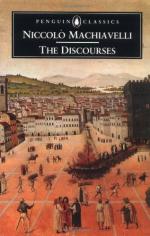
|
| Name: _________________________ | Period: ___________________ |
This quiz consists of 5 multiple choice and 5 short answer questions through Book One, The Development of Rome's Constitution, The Popular Demand for a Share in Government, The Management of the Populace, The Advantages of Popular Government.
Multiple Choice Questions
1. How does Machiavelli predict a citizen will conduct himself if he is not punished for his misdeeds because of his reputation for doing good deeds, according to Machiavelli.
(a) He will eventually become overwhelmed by his conscience and slip away into obscurity.
(b) He will, in short time, become so insolent as to put an end to all civil law.
(c) He will become the most effective aide to the Prince and help expand his power over the citizens.
(d) He will find ways to subvert the Prince and take his power.
2. Of what should Princes be most ashamed in Machiavelli's view?
(a) Lacking their own soldiers for defense and offense.
(b) Consuming his wealth in debauchery.
(c) Being discovered to be self-absorbed and not devoted to building the strength of their cities.
(d) Missing opportunities to conquer other cities.
3. According to Machiavelli, how did the Nobles of Rome attempt to correct the limit on the wealth that was placed on them by Agrarian Laws?
(a) They raised taxes on Plebes who used the land awarded to them by the Agrarian Laws.
(b) Rome would send out armies to colonize lands that were then distributed to Nobles.
(c) The Nobles took political control over the Senate and changed the laws to allow Nobles to control all the land of the Empire.
(d) They reduced taxes on themselves and used their increased wealth to buy back their land.
4. How does Machiavelli suggest that Princes and other leaders deal with acts that offend their citizens?
(a) Make the offense quickly then act to reassure them and give them cause to quiet and firm their spirits.
(b) Distract the Citizens by making war against a nearby province.
(c) Increase their power and penalties for crimes and scare the Citizens into submission and acceptance.
(d) Increase taxes on the wealthy and use the money in ways that benefit the general masses.
5. What were the reasons that Machiavelli cited for the Roman Senate choosing to pay a public stipend to fighting men (soldiers)?
(a) To keep the citizens in poverty so they would support wars.
(b) To increase the number of soldiers in the army.
(c) To hide the increased taxes that were used to build houses for Nobles.
(d) Because without the stipend, wars could not be made for any length of time, neither could Rome besiege towns nor lead armies to a distance.
Short Answer Questions
1. Why does Machiavelli consider the Roman Caesars to have been a benefit to the Roman Empire?
2. What did Machiavelli report led gatherings of people to make laws?
3. Based upon Machiavelli's details, for whose benefit were the "demonstrations made to the benefit" of Plebes devoted?
4. What did Machiavelli cite as the method that Rome used to maintain its freedom?
5. What do fertile areas offer to those who settle there according to Machiavelli?
|
This section contains 661 words (approx. 3 pages at 300 words per page) |

|




